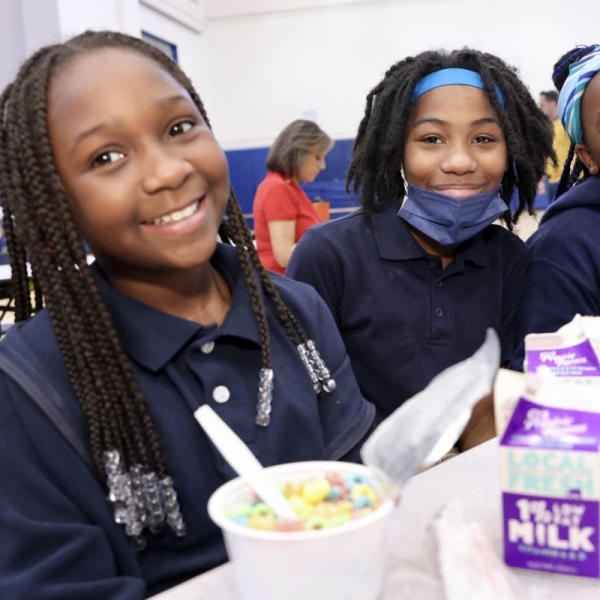Contents
All images credit: GENYOUth.
10 Sep 2024 — In the US, 65% of residents see food insecurity among children as a national priority, reveals the new “Youth Hunger and School Meals” survey by GENYOUth, a non-profit focused on ensuring all US children have access to healthy school meals. Conducted on the occasion of September’s Hunger Action Month, the survey finds that the same percentage also supports providing more state and federal resources to improve children’s food security and access to nutritious school lunches.
“With GENYOUth’s long-standing commitment to addressing youth food insecurity and building nutrition equity, including using research and insights to keep our finger on the pulse of public opinion, we found the results of the ‘Youth Hunger and School Meals’ survey to be illuminating and thought-provoking,” Karen Kafer, a registered dietitian nutritionist and a GENYOUth chief wellness officer, tells Nutrition Insight.
“In particular, although a relatively high number of US residents — two in five, or 95 million — know at least one child who has been impacted by food insecurity, almost two in three US residents (64%) are not aware that one in five US children currently lives in food insecurity,” she continues.
“Just 26% realize that 30 million students rely on school meals for a significant part of their daily nutrition — highlighting the need for awareness-building and education to close the information gap on food insecurity among children.’’
Kafer asserts that despite this gap, most US residents recognize the importance of school meals. “They support the allocation of more state and federal resources and funding to help feed hungry children, and three in five US residents understand that most children get their healthiest meals at school.”
School meal programs
The nutrition expert states that school meal programs play a vital role in addressing the broader issue of food justice for children, particularly in marginalized communities.

Karen Kafer, a registered dietitian nutritionist and a GENYOUth chief wellness officer.“As concerning as the numbers are for all US children, they are even worse in communities of color, including Black, Latinx and Indigenous. Schools are anchors of youth health and wellness, particularly in high-need school districts and communities. For many disadvantaged children, school meals are the only daily nutrition they can count on,” Kafer shares. https://www.nutritioninsight.com/news/latest-usda-report-reveals-growing-food-insecurity-among-us-households.html
“Our survey found that Black and Latinx respondents are more likely than White non-Latinx respondents to have been touched by food insecurity in some way — for example, 42% of Black and 39% of Latinx respondents know at least one child who has been impacted by food insecurity, versus 36% of White respondents.”
She adds that school meals promote food justice by offering access to healthier nutrition. “According to the US Department of Agriculture’s Food and Nutrition Service, children who participate in school meals consume more dairy milk, fruits and vegetables than non-participants, and they consume fewer desserts, snacks and non-milk beverages.”
“School meals provide 77% of total daily dairy milk consumption, and 70% of total dairy consumption for low-income children aged five to 18. In short, school meals are ‘living textbooks’ for lifelong healthy eating, with research linking participation in school meals to positive educational and health outcomes,” Kafer outlines.
Boost understanding
The survey further finds that respondents of the boomer and Gen X generations are more aware that US children get their healthiest meals at school, with 63% indicating that this is the case. Meanwhile, only 49% of Gen Zs and millennials were able to indicate that school meal programs are the country’s largest safety net for food insecurity among school-age children.
While the majority of the nation sees the need to tackle child food insecurity in the US as a national priority. Currently only nine states offer Universal School Meals or Healthy Meals for All programs that provide free school meals to children regardless of household income. Another 28 states have it under consideration.
“A barrier to expanding Universal School Meals nationwide is the lack of understanding of the positive impact they have on reducing food insecurity rates,” Kafer explains. “With the end of the pandemic and the dismantling of free school meals for all, food insecurity rates have skyrocketed.”
“In fact, since 2021, the number of children living in food-insecure households has increased a staggering 45%. With poverty rates on the rise, GENYOUth is ringing the school bell to end student hunger by raising awareness and educating on this critical issue.”
Urgent solutions needed
The chief wellness officer explains that GENYOUth does not advocate for specific policies or legislation.
“But we do believe in the urgency of more resources being directed at schools to help feed the millions of children who are food insecure and depend on school meals for their daily nutrition,” Kafer asserts.
“We also believe that public-private partnerships are a critical part of the solution, working with purpose-minded partners to raise funds to provide schools with meal equipment like grab-and-go meal carts that increase access to and participation in school meals by overcoming hurdles like time and stigma that many kids face in traditional school meal settings.”

School meal programs are vital to food justice for children in marginalized communities.Kafer also highlights that GENYOUth’s efforts to help end student hunger through equipment grants have increased access to school meals by up to 58%.
“When students are well nourished, they are more likely to score higher on standardized tests, improve concentration and memory and maintain better attendance,” she adds.
“Since GENYOUth’s foundation in 2010, and through our efforts to equip schools with critical tools and resources to provide students with access to nutrition and physical activity, over 40 million students now have more equitable access to healthy school meals or physical activity. Additionally, 76,000 school communities are supported by GENYOUth nationwide, 68% of which are considered high need.”
Hunger Action Month campaign
September is designated as Hunger Action Month in the US, with relevant stakeholders spreading awareness about the issue of food and nutrition security within the country.
“We are urging everyone to ‘raise your hand to end student hunger.’ Join GENYOUTH in getting the word out on social media — together, we can make a difference,” the expert highlights.
“In addition, our efforts during Hunger Action Month include the launch of Super School Meals, a community-based initiative that will tackle student food insecurity in the Super Bowl LIX’s home market of Louisiana in the lead-up to GENYOUth’s 2025 Super Bowl weekend fundraising initiative, Taste of the NFL, in February 2025.”
“We believe every child deserves the opportunity to be well-nourished (as well as physically active) and that the only hunger a child should have is a hunger to learn,” Kafer concludes.
By Milana Nikolova

